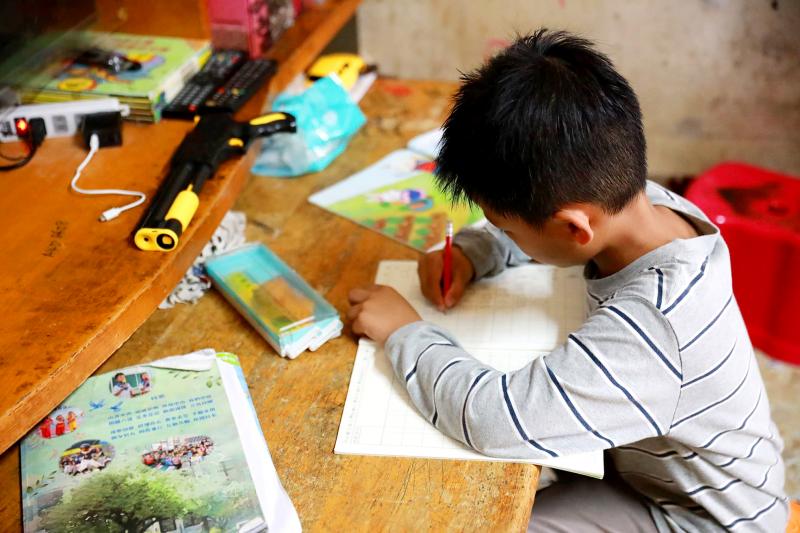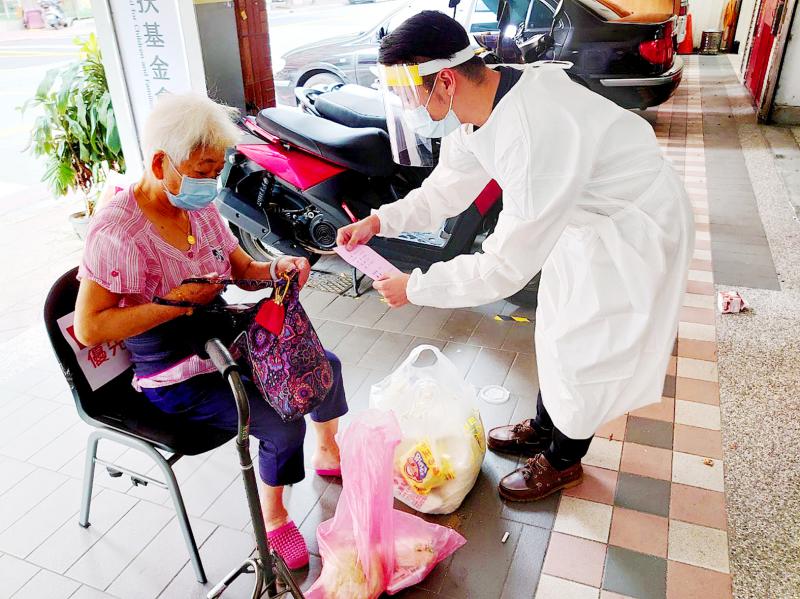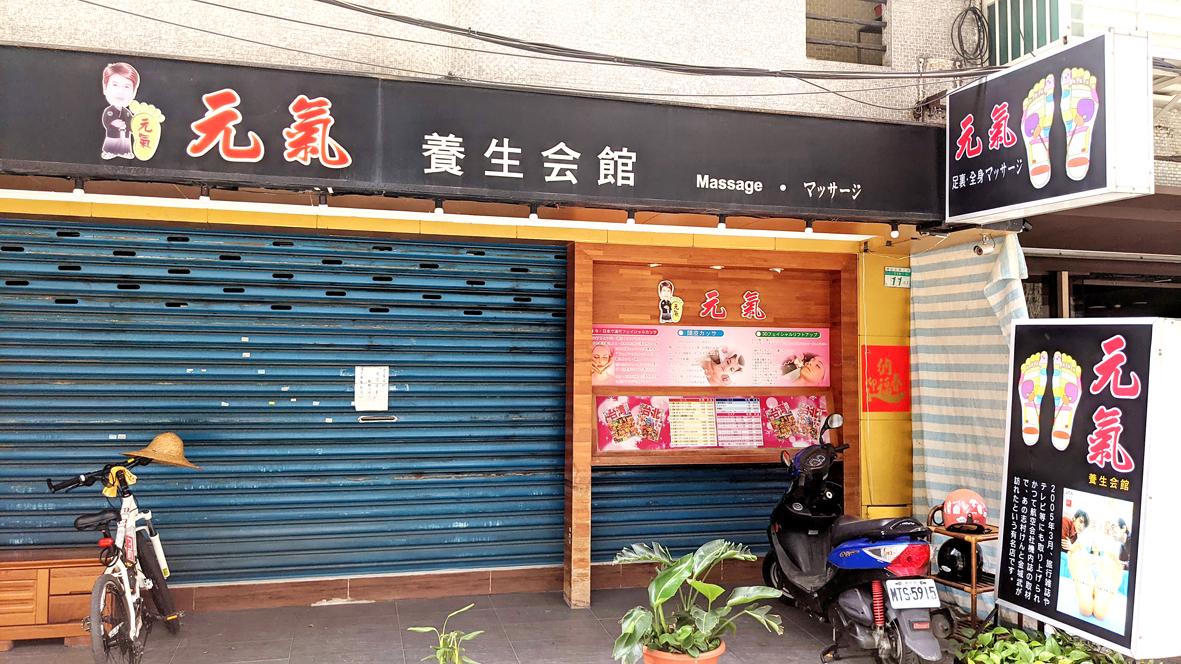With no way to make money during the outbreak and a developmentally delayed third-grader to raise alone, the only thing Mr Lin (林) can do is pray for vaccines.
“I just hope that people can get vaccinated and life can go back to usual soon,” Lin says during a Line interview. “It’s unfortunate that Taiwan’s awkward international status prevents us from getting vaccines.”
A foot masseuse catering to tourists in Taipei, Lin’s income already took a hit when the COVID-19 pandemic hit last year. With the latest outbreak shuttering massage parlors across the nation, he is now out of a job.

Photo courtesy of World Vision
Lin can no longer afford his son Hsiao-feng’s (小峰) daycare service, but he needs it more than ever as in-person classes are suspended. Since he has to watch Hsiao-feng during the day, it is hard for him to look for work. And few are hiring.
Lin is also unsure what else he can do, as he’s in his 50s and has been at his current profession for 15 years.
“I’ve been doing this for so long, I’m good at it and I’ve developed an interest in it,” he says.

Photo courtesy of Taiwan Fund for Children and Families
More than 1,000 families served by the Taiwan Fund for Children and Families are facing a similar predicament since the nationwide level three alert was announced last month. About 38 percent of the families were earning less than NT$20,000 per month, and 46 percent held temporary or service industry jobs that were the first to be hit by the outbreak.
About 68 percent of the non-profit organization’s households are single-parent, which makes it even harder to cope as the children are now all taking classes from home.
Hsiao-mei’s (小玫) mother, for example, had to take unpaid leave from her job at a printing factory to take care of her three kids. Hsiao-hua’s (小華) mother is facing the same situation with four children to look after.

Photo: Han Cheung, Taipei Times
The foundation has provided emergency financial assistance and supplies to these families, and its social workers are trying to help them figure out a feasible long term plan.
“They faced difficulties as soon as businesses closed in mid-May, so we provided immediate financial assistance,“ says social worker Yen Chun-jung (顏君容), who has been working with Lin since Hsiao-feng was diagnosed about six years ago. “After they start receiving government aid, we check with them if it is enough to get by, and discuss what else we can do to help them get through this outbreak.”
Yen says Lin has been very proactive in seeking help and bringing Hsiao-feng to weekly early intervention classes. The child is adjusting well today and by last year he had pretty much caught up to his peers.
“As he grew older, I saw that he was able to make friends, and his development was picking up,” Lin says. “Only then could I relax. It’s been a very tough journey.”
Last year, Lin tried working at a relative’s construction business, but it proved too strenuous and dangerous for someone his age. He quit after suffering a hard fall.
“I thought, my son is still young, and I decided to go back to foot massaging,” Lin says. “It wasn’t much money, but income is income, even though it was scary for me to be in close contact with people during the pandemic.”
Yen is concerned because even if Lin eventually goes back to work, school is not an option for Hsiao-feng as summer vacation approaches.
“He doesn’t have any backup resources and he works at a high-risk job,” Yen says. “We worry about the child if something happens.”
The foundation is also finding ways to ensure that students from low-income families have access to remote learning. Many families have to borrow devices from schools or relatives, and in some cases several children share a parent’s cell phone.
Pei-pei’s (佩佩) family is among the 60.6 percent of families assisted by the foundation that do not have a computer, laptop or tablet. Her father is legally blind and cannot work, while her mother is a hairdresser in a rural salon that charges NT$100 per cut.
Pei-pei and her younger brother use their father’s cell phone to stay connected to school, but it’s hard to complete the exercises and necessary tasks without a proper device. With paying the bills a challenge, the family does not have extra resources to resolve the issue.
The foundation recently participated in the “One Person, One Tablet” drive organized by the Taiwan Mobile Foundation, which within two weeks reached its goal of collecting 619 devices for children like Pei-pei last Sunday.
For more information, visit ccf.org.tw

In the next few months tough decisions will need to be made by the Taiwan People’s Party (TPP) and their pan-blue allies in the Chinese Nationalist Party (KMT). It will reveal just how real their alliance is with actual power at stake. Party founder Ko Wen-je (柯文哲) faced these tough questions, which we explored in part one of this series, “Ko Wen-je, the KMT’s prickly ally,” (Aug. 16, page 12). Ko was open to cooperation, but on his terms. He openly fretted about being “swallowed up” by the KMT, and was keenly aware of the experience of the People’s First Party

Not long into Mistress Dispeller, a quietly jaw-dropping new documentary from director Elizabeth Lo, the film’s eponymous character lays out her thesis for ridding marriages of troublesome extra lovers. “When someone becomes a mistress,” she says, “it’s because they feel they don’t deserve complete love. She’s the one who needs our help the most.” Wang Zhenxi, a mistress dispeller based in north-central China’s Henan province, is one of a growing number of self-styled professionals who earn a living by intervening in people’s marriages — to “dispel” them of intruders. “I was looking for a love story set in China,” says Lo,

It was on his honeymoon in Kuala Lumpur, looking out of his hotel window at the silvery points of the world’s tallest twin skyscrapers, that Frank decided it was time to become taller. He had recently confessed to his new wife how much his height had bothered him since he was a teenager. As a man dedicated to self-improvement, Frank wanted to take action. He picked up the phone, called a clinic in Turkey that specializes in leg lengthening surgery — and made a booking. “I had a lot of second thoughts — at the end of the day, someone’s going

Aug. 25 to Aug. 31 Although Mr. Lin (林) had been married to his Japanese wife for a decade, their union was never legally recognized — and even their daughter was officially deemed illegitimate. During the first half of Japanese rule in Taiwan, only marriages between Japanese men and Taiwanese women were valid, unless the Taiwanese husband formally joined a Japanese household. In 1920, Lin took his frustrations directly to the Ministry of Home Affairs: “Since Japan took possession of Taiwan, we have obeyed the government’s directives and committed ourselves to breaking old Qing-era customs. Yet ... our marriages remain unrecognized,